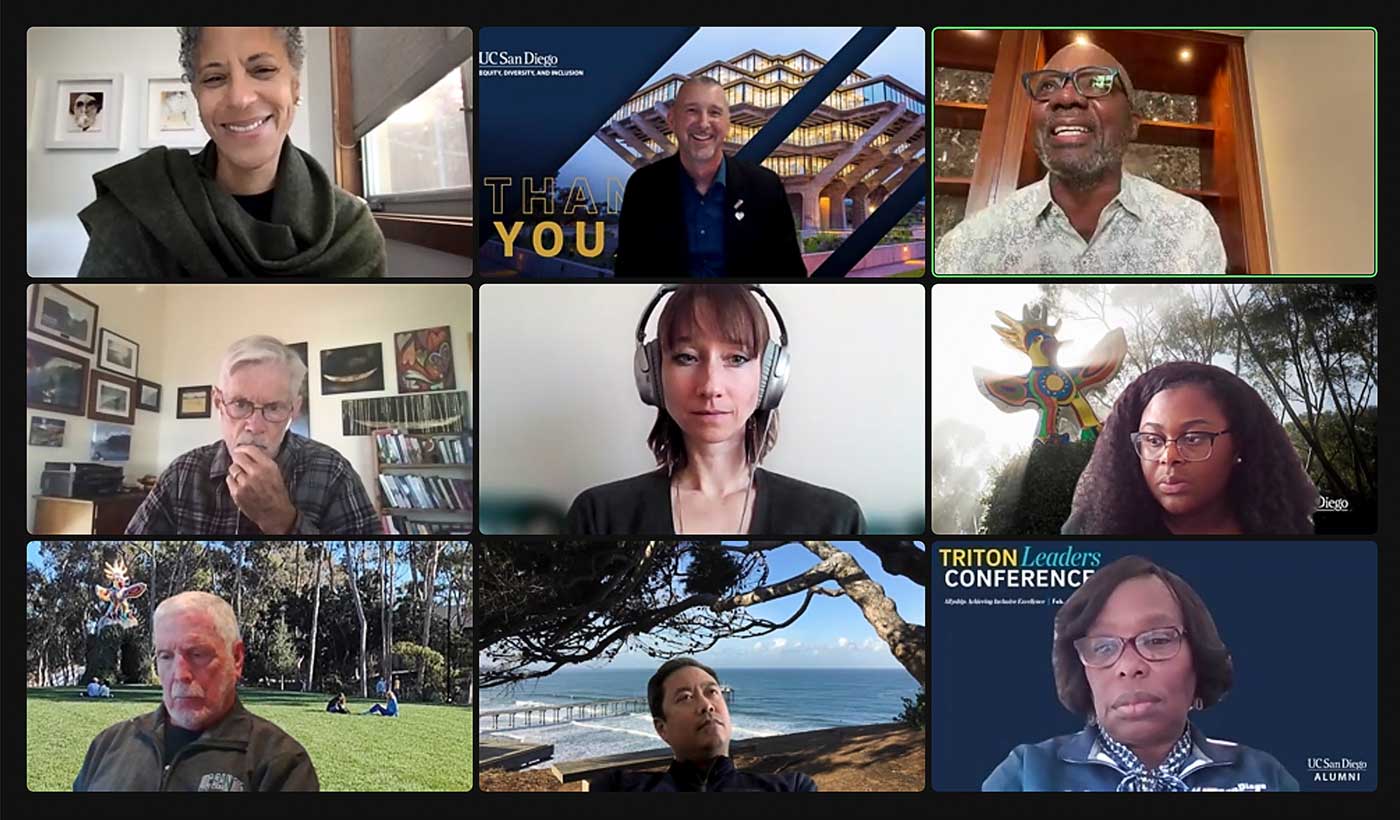By:
- Erika Johnson
Published Date
By:
- Erika Johnson
Share This:

Wise Words: Four Steps to Becoming an Ally
What is allyship? It is an opportunity to re-evaluate personal beliefs through listening; taking action to dismantle systems of oppression; and consistently working together to advance equity for those who are disempowered.
Allyship was the central theme of last week’s Triton Leaders Conference—a two-day virtual event led by UC San Diego Alumni. To open the conference, UC San Diego Alumni and the Office for Equity, Diversity and Inclusion invited Tim Wise to deliver a keynote talk on how to become an effective ally. An anti-racist writer, educator and commentator, Wise has spent three decades educating audiences about issues of race, class, gender and sexuality as well as avenues for social change. He has authored nine books, including his latest, “Dispatches from the Race War,” and his acclaimed memoir, “White Like Me.”
During his discussion, Wise shared four ways to become a strong ally for both newcomers and seasoned supporters. And for campus members who are eager to get started in solidarity work or strengthen their allyship contributions, we offer several ways to get involved.
One: Make allyship a verb
In the summer of 2020, a “racial reckoning” was sparked following the murder of George Floyd. According to The New York Times, 500,000 people rose in protest in nearly 550 cities across the United States on June 6, 2020—the peak day among several months of growing demonstrations that an estimated 15 to 26 million people participated in.
But has fervor waned? A recent article from NBC News cited a poll that indicates support for racial justice movements has dropped. According to Wise, a long-term commitment is key to making a difference as an ally. More than a temporary trend, it means actively participating, learning, making mistakes and being humble throughout the journey.
“An ally is not what you are; it’s what you do,” explained Wise during the conference. “I think sometimes if we understand it as a process...as opposed to this fixed thing in time we [will] have a healthier attitude about our own relationship to the notion of solidarity.”
Two: Make a genuine connection with whom you are serving as an ally
Wise found his “why” when he was 11 years old. He was a member of a baseball team that was predominantly composed of Black players. One day his team was invited to play a scrimmage match against another team across town, but they refused to compete against a Black team. When Wise’s team tried to leave, they were surrounded and threatened, accosted with hateful language.
“My solidarity comes from that sense of shared purpose and shared commitment; the stuff you see never leaves you,” reflected Wise during the event. “The reason that I do anti-racism work and the reason that I am the person in the world that I am; it’s not because of the classes I’ve taken; it’s not because of the books I’ve read; it’s because of the people I knew.”
To be a successful ally, it is important to make a connection with the people and communities with whom you are allying, Wise explained. When you are driven by a fire in your heart, you will continue no matter how many setbacks you face.

Five interactive breakout sessions were held during the Triton Leaders Conference, which included discussion topics ranging from “Allyship in the Workplace” to “Cultivating Inclusivity” and “Equity in Healthcare.”
Three: Be hard on systems and soft on people
The third element of allyship that Wise discussed was the idea that racism, sexism, classism and many other forms of oppression are primarily the result of faulty systems rather than flawed individuals. The idea that other people are “lesser than” is an ideology that has been established and perpetuated through generations.
“You don’t end up with inequality as profound as we have in this country...just because of individual prejudiced people who decide to hurt other people,” shared Wise at the conference. “You get that because of the systems that you’ve inherited over time. And here we are in 2022 having inherited hundreds of years of inequality.”
To be an effective ally, Wise recommends focusing on the networks, policies and structures that keep certain people in power and others sidelined—taking a broader look at the source of oppression and how it has been perpetuated.
Four: Use active language
Words such as “underprivileged” and “underrepresented” are often used to describe populations in a passive way who are struggling or have been marginalized. Wise calls attention to this language and the way that it minimizes the unequal systems that caused these very situations.
“We take it for granted that people end up where they end up, like it’s a coincidence,” said Wise during his keynote talk. “The people who are on the bottom of our social, political and economic structures didn’t just wake up and find themselves there...active measures, policies, practices, procedures—a history of unequal opportunity brought us to that place. When you say underprivileged, underserved, underrepresented...you're using passive language that minimizes the active component of injustice.”
As allies working to address systemic racism and other social justice issues, Wise recommends careful consideration of language. Words can be powerful ways to shed light on the root causes of circumstances that lead populations to become marginalized.
How do I get started as an ally?
Each of us has an opportunity to lead in our own spheres of influence. Here are a few opportunities at UC San Diego to strengthen your role as an ally:
- Take part in the White Allyship, Action and Accountability Initiative, a self-paced educational program that is open to people of all races and ethnicities with a focus on engaging white campus community members in organizing and partnering to eliminate systemic racism. Move from awareness to action by developing and deepening capacity to identify, engage and mitigate racism, and share in the responsibility for creating an anti-racist campus.
- Volunteer to help lead an annual cultural celebration or participate to learn more about diverse cultures and identities. Throughout the month of February, there are numerous events being held in honor of Black History Month. Topics range from increasing representation in STEM to Afro-Caribbean dance and drumming as well as the history of colonialism.
- Visit and engage with one of the six Campus Community Centers. Each space offers an opportunity for students, staff and faculty to engage more deeply with their own identity while learning about the perspectives of others through open dialogue and social justice education.
- Serve as a Leader for Equity Advancement and Diversity (LEAD) Fellow—a campus champion who engages and leads crucial conversations around improving organizational learning and campus climate. Fellows receive extensive training to facilitate conversations, provide leadership and promote diversity and excellence across campus in the yearlong program.
Share This:
Stay in the Know
Keep up with all the latest from UC San Diego. Subscribe to the newsletter today.



